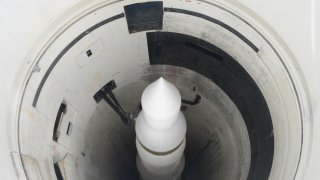Americans Shouldn't Doubt the Nuclear Chain of Command
Much of the concern about the U.S. chain of command for authorizing nuclear first use or retaliation is understandable, but, for the most part, is based on misinformation or purely political motives.
Second, in response to the acceleration of prompt threats, some might suggest fully automating the nuclear warning, attack characterization, and response systems, perhaps with advanced artificial intelligence systems. Although future technology will doubtless permit automation of some aspects of warning, command and control, and responsive decision for nuclear attack, the U.S. president must maintain sole authority for nuclear first use, first strike, or retaliation.
Ideally, the same standard should apply to space-based attacks on American spaceborne strategic assets and to cyber attacks on American vital infrastructure, although their speed and stealth will also create a temptation for built-in automatic responses. Additionally, the timing for activating missile defenses in response to a credible warning of an attack will also be influenced by available technology and human decisionmaking processes. In all cases, the rule must be to convey continued confidence in the ability of the United States to react to nuclear first use or first strike with appropriate and deliberate responses, sensitive to policy guidance and the requirements for deterrence and defense.
Lawrence J. Korb is a senior fellow at American Progress and an adjunct professor at Georgetown University. He was previously a senior fellow and director of national security studies at the Council on Foreign Relations.
Stephen J. Cimbala is a distinguished professor of political science at Penn State Brandywine and the author of numerous books and articles on international security studies, defense policy, nuclear weapons and arms control, intelligence, and other fields.
Image: Shutterstock.

